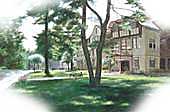Spring
1978
A Light That Shineth
in a Dark Place
Bob and Elizabeth Lake
Pinecrest Graduates
Like many who have an understanding of God’s purposes,
the prophet Habakkuk found himself in a dark and difficult
situation that seemed even to contradict the promise of God.
In deep distress, he framed his three famous questions: “Why?
Wherefore? How long?” Receiving no answer but the silence
of God, Habakkuk resolved to wait upon the Lord. “I
will stand upon my watch, and set me upon the tower, and will
watch to see what He will say unto me. . .” (Habakkuk
2:1). Although the Lord never answered the prophets’
questions concerning the immediate circumstances, He used
the pressure and frustration of a “dark place”
to draw Habakkuk into a revelation of Himself. Habakkuk gained
an eternal vision of far greater dimension than his limited
questioning had demanded. God often deals in this manner with
those hearts who are set for His highest and best.
The scriptures mention Joseph of Arimathea only four times;
yet that which is recorded speaks volumes to us. Significantly,
all four gospels remember him as the man who begged the crucified
body of Jesus from Pilate, prepared it for burial, and laid
it in his own tomb (Matthew 27:57-60; Mark 15:42-46; Luke
23:50-53; John 19:38-42). But Mark and Luke add this fact:
Joseph of Arimathea “. . . also himself waited for the
kingdom of God.” He was willing to lay the Son of the
Living God in a tomb and seal it with a stone, while waiting
for the kingdom of God. How like our vision of God; for if
our vision is truly a work of the Spirit, we will be able
to “let go” of it while trusting Him to bring
it to fruition in our lives. Like Joseph, we can trust in
the Lord, knowing that He “doeth all things well,”
and that “the Lord is not slack concerning His promise.”
Even when circumstances seemingly negate the faithfulness
of God, we can sing with Habakkuk, “Although the fig
tree shall not blossom, neither shall fruit be in the vine;
the labour of the olive shall fail, and the fields yield no
meat; the flock shall be cut off from the fold, and there
shall be no herd in the stalls; Yet will I rejoice in the
Lord, I will joy in the God of my salvation” (Habakkuk
3:17, 18). This faith that God is developing in us is one
of an eternal quality that will trust God even when the hope
of our vision has been sealed in the tomb. This is the faith
the early apostles possessed. They could preach, “Little
children, it is the last hour,” because their vision
of the kingdom was unlimited and eternal. They saw past two
thousand years and “tasted of the powers of the age
to come.” They were anchored by a steadfast vision of
the glorified Christ.
Jesus, speaking of His imminent transfiguration in the mount
before Peter, James, and John, said that “there be some
standing here which shall not taste of death, till they see
the kingdom of God” (Luke 9:17). The consummation of
this experience to which He referred was a Voice from heaven
that thundered from the overshadowing cloud, saying “This
is my beloved Son; hear him” (Luke 9:35). The kingdom
of God which Jesus had said they would see was His own manifestation
in Glory. Peter referred to this timeless vision of the glorified
Lord when he wrote, “And this voice which came from
heaven we heard, when we were with him in the holy mount.
We have also a more sure word of prophecy; whereunto ye do
well that ye take heed, as unto a light that shineth in a
dark place, until the day dawn, and the day star arise in
your hearts” (2 Peter 1:18, 19).
The Light of the Person of Jesus Christ, the Eternal Word
Himself, shines in a “dark place.” And as the
Lord spoke to Habakkuk, “Though it tarry, wait for it;
because it will surely come.” Habakkuk 2:3


